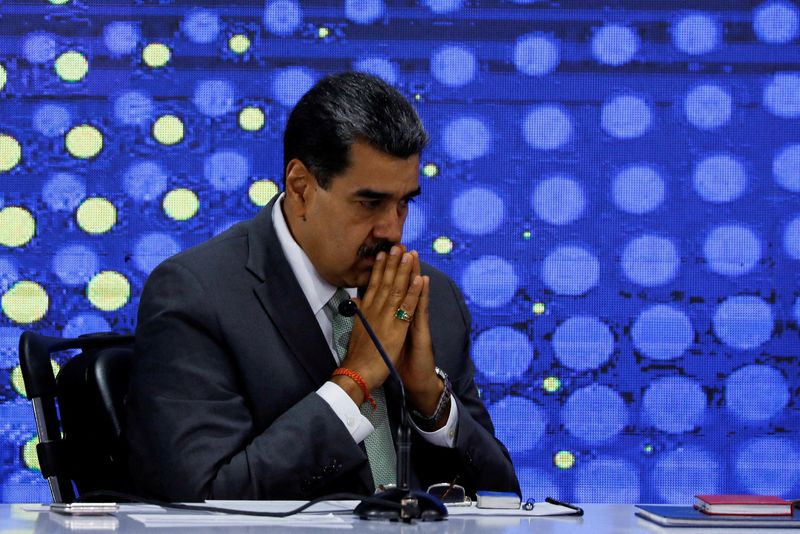By Matt Spetalnick, Daphne Psaledakis and Marianna Parraga
WASHINGTON/HOUSTON (Reuters) -The Biden administration said it would not renew a permit set to expire early on Thursday that had largely eased oil sanctions in Venezuela. She decided to reintroduce punitive measures in response to President Nicolas Maduro’s failure to keep his election promises.
Just hours before the deadline, the US Treasury Department announced on Wednesday that it had issued a replacement permit giving companies 45 days to wind down their activities and transactions in the OPEC country’s oil and gas sector.
Washington had repeatedly threatened in recent months to reimpose energy sanctions unless Maduro fulfilled his promises that led to partial relief from US sanctions from October, following a US-backed election deal between the government and the Venezuelan opposition.
The sweeping sanctions on Venezuela’s oil industry were first imposed by the Trump administration in 2019, following Maduro’s re-election victory, which the US and other Western governments rejected.
While Maduro has fulfilled some commitments in last year’s deal, he has failed to meet other obligations, including allowing the opposition to field the candidate of its choice against him in the July 28 presidential election, they said senior US officials.
As a result, the administration plans to let the current six-month general license expire without renewal just after midnight EDT, State Department spokesman Matthew Miller said.
“We are concerned that Maduro and his representatives have prevented the democratic opposition from registering the candidate of their choice, harassed and intimidated political opponents, and wrongfully detained countless political actors and members of civil society,” Miller said in a statement .
Several opposition allies and activists have been arrested in recent months, which sources close to the ruling party say is likely a government response to declining domestic support for Maduro.
However, Jorge Rodriguez, the head of the government-affiliated Venezuelan legislature, said Caracas had met the terms of last year’s agreement. The reinstatement of sanctions was “a damaging action against Venezuela,” he told a news conference later on Wednesday.
The withdrawal of the key element of US sanctions relief marks a major step back from US President Joe Biden’s policy of reengaging with the Maduro government.
But the Biden administration is abandoning a full return to the “maximum pressure” campaign waged under former US President Donald Trump.
And a US official said the move “should not be seen as a final decision that we no longer believe Venezuela can hold competitive and inclusive elections,” adding that Washington would continue to engage with Maduro’s representatives.
The US decision was influenced by concerns over whether a rollback of sanctions could lead to higher global oil prices or increase the flow of Venezuelan migrants to the US-Mexico border as Biden campaigns for re-election in November .
A senior government official said the internal discussion covered a range of issues, but the final decision was fundamentally based “on the actions and inactions of the Venezuelan authorities.”
FIGHT TO MAKE SANCTIONS DECISION
Biden’s aides struggled to come up with an approach that would punish Maduro but not harm U.S. interests through the expiration of the permit that has allowed Venezuela to freely sell its crude, U.S. sources said.
Venezuelan officials have insisted they are ready for any scenario and can weather renewed sanctions.
“We are open (for business) and ready to continue making progress, together with all foreign companies that want to come,” Oil Minister Pedro Tellechea told reporters after the US announcement. “Venezuela is ready to secure the stability of global oil markets that we so desperately need.”
Venezuelan oil exports rose in March to the highest level since early 2020 as customers rushed to complete their purchases before the predicted license expiration, Reuters reported this month.
While leaving the door open for companies to apply for specific permits on a case-by-case basis, the Treasury Department warned that “engaging in new activities, including new investments, previously authorized” under the expiring general permit is not permitted are.
Since the easing of sanctions in October, Venezuela has made slow progress in rebuilding its manufacturing capacity, with crippled infrastructure and a lack of new investment continuing to limit what the country can achieve.
The license revocation is expected to put a cap on Venezuela’s crude production growth unless Washington grants enough individual licenses to make up for it, analysts said.
Any activity under the expiring general permit must be completed by May 31.
Certain US authorizations separate from that license remain unaffected, including the permission granted Chevron (NYSE:) since 2022 to sell oil in the US from its joint ventures in Venezuela, as well as existing approvals for European companies to purchase Venezuelan oil.

One of the biggest U.S. concerns about election conditions in Venezuela is the crackdown on Maduro’s political opponents, especially the blocking of leading opposition candidate Maria Corina Machado.
Venezuelan authorities have maintained an election ban on Machado, who won the opposition primaries by a large margin last October. The opposition is currently conducting internal negotiations over who could nominate as a replacement.


